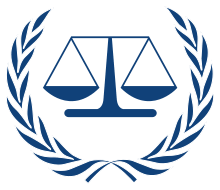Völkerstrafgesetzbuch
The Völkerstrafgesetzbuch or VStGB ("Code of Crimes against International Law") is a German law that regulates crimes against (public) international law. It was created to bring the German criminal law into accordance with the Rome Statute of the International Criminal Court. It was announced on 26 June 2002 and became law 30 June 2002. It covers the following offenses:
- Genocide (§ 6)
- Crimes against humanity (§ 7)
- War crimes (§§ 8–12)
None of these are subject to a statute of limitations (§ 5). The general principles of criminal law under the Strafgesetzbuch (German penal code) remain applicable, unless otherwise provided (§ 2). As a novelty under German criminal law, provisions on superior responsibility are established (§§ 4, 13, 14). Acting upon superior orders may only exculpate a perpetrator of international crimes in exceptional circumstances (§ 3).
According to § 1, genocide, crimes against humanity, and war crimes are subject to universal jurisdiction, thus German courts can punish offenses committed by foreign citizens abroad. Prosecutorial jurisdiction lies with the Public Prosecutor General. Competent courts at first instance are the Oberlandesgerichte (Higher Regional Courts). The prosecution of crimes committed outside German jurisdiction is limited by § 153f of the German Criminal Procedural Code, which gives the Public Prosecutor General a wide discretion of when to open a case via universal jurisdiction, if the offender is not of German nationality. So far the Public Prosecutor General's office has suspended persecator measures for 128 cases brought to its attention involving international crimes pursuant to the German International Criminal Code.
In May 2011, the trial of two Rwandan citizens, Ignace Murwanashyaka and Straton Musoni, began before the Oberlandesgericht in Stuttgart, Germany. This is the first trial under the Völkerstrafgesetzbuch in Germany.[1][2] In September 2015, the accused where sentenced to 13 and 8 years in prison.[3]
References
- ↑ "Rwanda: Ignace Murwanashyaka and Straton Musoni tried". BBC. 4 May 2011. Retrieved 2011-05-05.
- ↑ "Oberlandesgericht Stuttgart (5. Strafsenat) eröffnet Hauptverfahren gegen zwei mutmaßliche Führungsfunktionäre der "Forces Démocratiques de Libération du Rwanda" (FDLR )". Oberlandesgericht Stuttgart (in German). 4 March 2011. Retrieved 2011-05-05.
- ↑ "Conviction of FDLR leaders by German Court". Armed Groups and International Law. 28 September 2015. Retrieved 2015-10-01.
See also
External links
- Full text of the Völkerstrafgesetzbuch (in German, official text)
- Full text of the Völkerstrafgesetzbuch (in English, unofficial translation)
- Translations of the Völkerstrafgesetzbuch (Arabic, Chinese, English, French, Greek, Portuguese, Russian, Spanish; translated by the Max Planck Institute for Foreign and International Criminal Law)
- Section 153f of the German Criminal Procedural Code (in English)
- Rome Statute of the International Criminal Court
